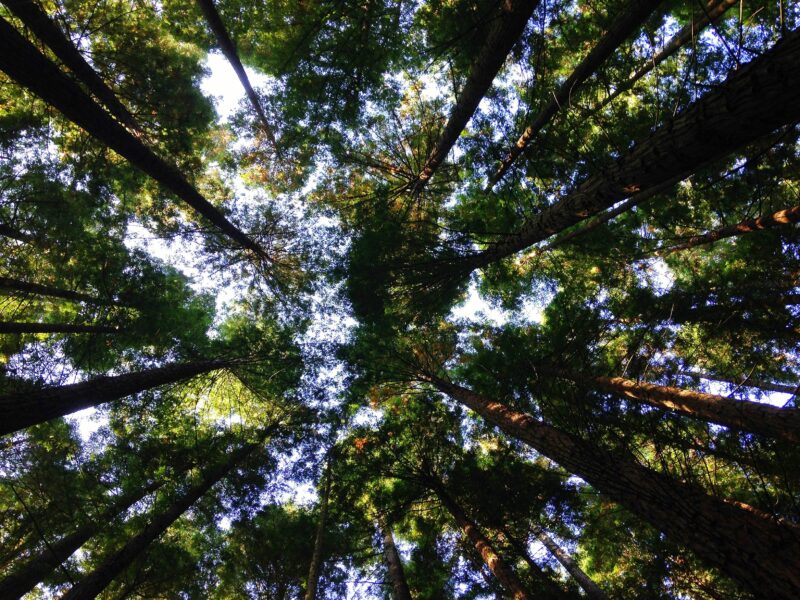For two religious sisters, discovering how to link their concern for the environment with their religious calling meant returning to the classroom. Inspired by Laudato Si’, the encyclical on the care for the environment promulgated by Pope Francis in 2015, Sister MaryAnne Francalanza, FCJ and Sister Benedicta Lim, OSB arrived in Toronto from England and Korea respectively in September 2023 as eco-missionaries for their religious communities. Studying at the Regis St. Michael’s Faculty of Theology, (RSM) and particularly within its Elliott Allen Institute for Theology and Ecology (EAITE), has given them a community, hope, and the tools to champion change that they will take back home.
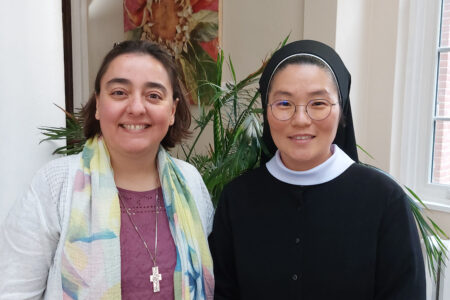
“Science gives us the facts and can help with finding technological solutions, but what needs to be done in order to live in harmony with the Earth and all God’s creatures is change hearts, and that’s in the realm of faith,” says Sister MaryAnne, who had spent 17 years teaching math at a secondary school in Liverpool, England.
She is here for one-year post graduate diploma at the EAITE. As a Faithful Companion of Jesus, she left her teaching position in 2022 to complete her tertianship, a year away from active ministry to deepen her understanding of the FCJ life and charism. In addition to her teaching, Sister MaryAnne describes herself as an “eco-warrior” in her school. She was known to take simple actions like encouraging the students not to waste resources; working with a team of senior students to campaign for meat-free Mondays in the school canteen; and including care for the Earth in prayers and the liturgy. During her year of reflection, she realized she was being called to pursue this passion more purposefully.
The release of Pope Francis’ Laudato Si’ in 2015 compelled the Congregation to make care for our planet one of its priorities at its 2019 General Chapter. This year of study supports that priority.
She has enjoyed being able to take courses at RSM, as well as at Trinity College and Emmanuel College, which are also members of the Toronto School of Theology, a consortium of seven theological schools, affiliated with the University of Toronto.
“There’s a cross pollination with people of other denominations, and even of other faiths. In these classes, whenever ecology, climate change or creation is brought up, students want to talk about it and they all bring different lenses to the material,” she says.
When Sister MaryAnne returns to England in the fall, she will be taking back knowledge, ideas, and experiences that she hopes to share in parishes and schools. “I want to build on the good work that other people have already done,” she says.
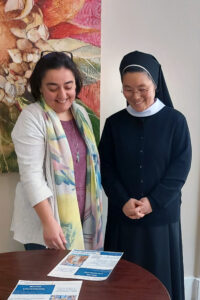
Sister Benedicta is a member of the Olivetan Benedictine Sisters of Busan in South Korea. Her Congregation joined the Laudato Si’ seven-year action plan and that was the occasion for the Council to send someone to study eco-theology. Sister Benedicta’s Mother Superior requested that she study eco-theology specifically at RSM because the program is internationally recognized and known to the community, as two priests they know had returned after earning their doctorate degrees from RSM.
The Olivetan Benedictine Sisters of Busan are called to do whatever work is needed by the Church and this charism includes working directly with the Earth, so some of their ministries involve farming. Through her studies, Sister Benedicta has come to realize that her community demonstrates concern for the environment through all its ministries, and especially its work with the marginalized. As she gains an eco-theological perspective, she realizes how eco-issues disproportionately affect the poor and disadvantaged.
“Pope Francis sees the poor usually as having the cry of nature. When nature is harmed, people, usually the marginalized, are also being hurt and that’s what eco-theology uncovers. I hope to have their voices be heard,” says Sister Benedicta.
Prior to coming to Toronto, Sister Benedicta had been involved in her community’s parish ministry. She is now in her first year of a Master of Theological Studies degree at RSM, while also earning a certificate in theology and ecology from the EAITE.
While it may have been her community that sent her to study, she wants to apply what she is learning to her life of service. “Ecological theology is not something to study and be done with. It’s something that I must carry until the end in my life,” she says. She thinks her education will give her the confidence to speak up more about environmental issues and have a bigger impact on decision making.
“It has absolutely been wonderful to have Sr. Benedicta and Sr. MaryAnne as part of our community. They have brought their unique interest in eco-spirituality and have enriched our conversations on eco-theology with their passion for and commitment to eco-justice,” says EAITE director Prof. Hilda Koster.
The EAITE oversees a certificate and diploma in ecological theology at RSM. Founded in 1991, it is one of the oldest institutes to offer ecological theology programs, and the only Catholic institute in North America to do so.
Join Dr. Hilda Koster, the new holder of the Sisters of St. Joseph in Toronto Chair in Theology, at her first St. Michael’s conference November 11 and 12. Learn more about the conference from Dr. Koster’s description below.
- Thursday, November 11: 7 p.m. –8:30 p.m. ET
- Friday, November 12: 8:30 a.m. – 1:15 p.m. ET
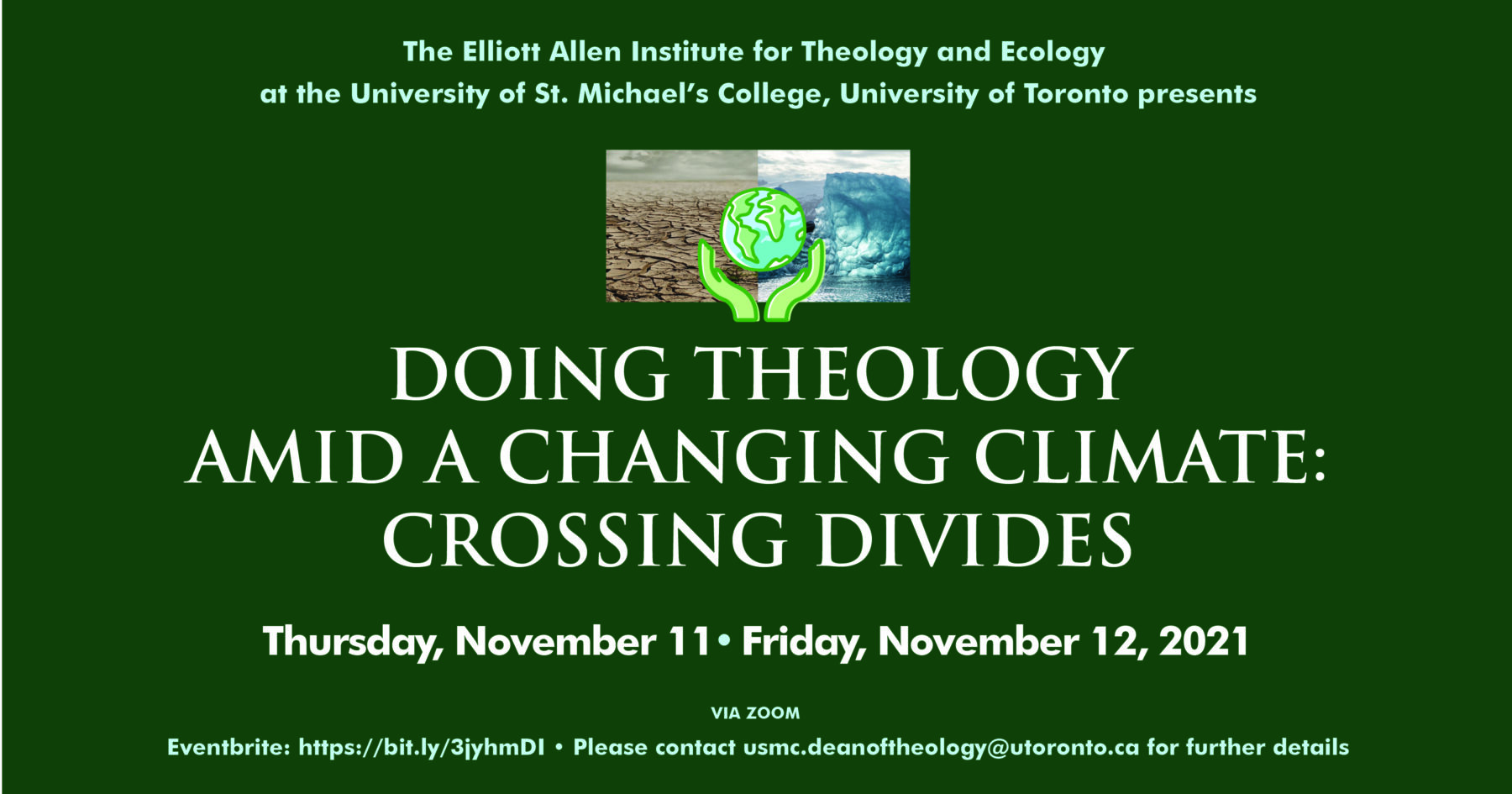
As world leaders gather at the COP 26 UN Climate Change Conference in Glasgow to implement the Paris climate agreement, the web-conference “Doing Theology Amid a Changing Climate: Crossing Divides” explores Christian theology’s contribution to the cultural, social, and spiritual transitions needed. Together with scientists and leaders from other faith traditions, Christian churches and communities have provided common witness on climate change. Yet because climate change is not simply an issue to be addressed but signals a need for a radical change in the way we inhabit a damaged planet, theologians and scientists discuss what more is required at this crucial geo-historical moment.
The speakers and panelists will ask how we can more effectively collaborate across disciplines and align our theology with cosmology and evolutionary science. How can we overcome divisions on climate science in a post-truth world? Which revelations of the sacred will nurture our interdependence with one another and the more than human world? And, as climate change further divides climate privileged and vulnerable communities along lines of race, gender, and ethnicity, how may theologians and community leaders work together to address questions of climate justice?
This conference is hosted by the Elliott Allen Institute for Theology and Ecology at the University of St. Michael’s College (Toronto), a leading interdisciplinary Institute for scholarship and dialogue rooted in the Catholic intellectual tradition.
Thursday, November 11
7–8:30 p.m.
A keynote speech delivered the night before by Franciscan Sr. Ilia Delio of Villanova University in Pennsylvania will set the scene for panel discussions of climate justice, gender justice, climate science and climate anxiety and the Church’s response. (The Catholic Register, Oct. 23, 2021)
Keynote: “Earth’s Fragility and the Crisis of Transcendence: Why Science and Religion Must be Reconciled”
Speaker: Dr. Ilia Delio, OSF Josephine C. Connelly Endowed Chair in Theology at Villanova University
Friday, November 12
Session 1: Climate Justice and Gender Justice: Addressing Inequities and Working across Difference (8:30 – 10:00 a.m.)
To many poor and minority communities, climate change means death and destruction on an ever-larger scale. Women and gender-diverse people are especially vulnerable. Speaking from various contexts and in solidarity with communities in both the global North and South this panel of renowned Catholic women theologians discusses these inequities and injustices with a focus on resource extraction and gender justice.
Session 2: Theology and Climate Science: Addressing Indifference, Fear, and Denial (10:15 – 11:30 a.m.)
To address climate change, theologians and climate scientists need to further engage in dialogue across disciplines. This panel explores the possibilities and challenges for this collaboration. How can climate science inform Christian theology? How can they both challenge religiously motivated climate change denialism? How can theology address fear and deep-seated anxiety about the consequences of climate change? What role do climate scientists see for the wisdom and power of religion and spirituality?
Session 3: Working across Ecclesial and Colonial Divides (11:45 a.m. – 13:15 p.m.)
Despite considerable ecumenical efforts towards a common witness, Christianity remains deeply divided on ethical issues, including climate change. Theologians representing various confessional and ecclesial traditions and communities address the challenges of ecumenical collaboration. Can Catholics come together with other Christians around the vision for climate justice and sustainability that Pope Francis unfolds in the encyclical Laudato si’? Can Christians from the global South and North work together to address issues of climate injustice amidst the enduring legacy of colonialism?
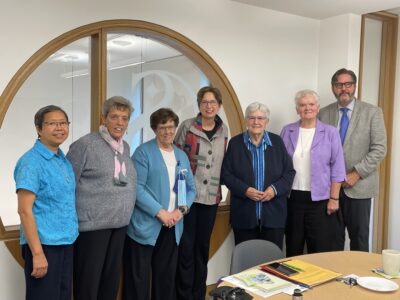
Dr. Hilda Koster, a professor of feminist theology and ecotheology, has been named the new holder of the Sisters of St. Joseph of Toronto Chair in Theology. Dr. Koster joined the University of St. Michael’s College’s Faculty of Theology in July 2020 and was appointed head of the Elliott Allen Institute for Theology and Ecology (EAITE) earlier this year.
“We welcome Dr. Hilda P. Koster to the Chair for 2022 onward and look forward to how her eco-feminist perspective will enrich theological studies for students and faculty,” says Sister Georgette Gregory, who is Congregational Leader for the Sisters of St. Joseph of Toronto.
Calling it “a great honour and pleasure” to be named Chair, Dr. Koster says she is grateful for the Sisters’ support for her work, and for that of the Faculty overall, noting that “this Chair reflects the Congregation’s longstanding commitment to theological education in feminist and ecological theology.
“The fact that this important Chair is now attached to the Faculty position in ecological theology offers important recognition of the leadership in the field of ecological theology that the Faculty of Theology, through the Elliott Allen Institute for Theology and Ecology, has provided for the past 30 years,” Dr. Koster says. “I look forward to a closer collaboration with the Sisters of St. Joseph of Toronto and hope to create opportunities for our students to learn from and get involved with the Congregation’s important eco-justice ministry and its advocacy work on clean drinking water.”
The Sisters of St. Joseph of Toronto established a Chair in Systematic Theology at St. Michael’s Faculty of Theology in 2007. Dr. Koster is the third person to hold the Chair, previously held by Dr. Margaret O’Gara and then Dr. James Ginther.
“We welcome this opportunity to support the Faculty of Theology, to commit to the advancement of theological education, and to honour the legacy of our Sisters at St. Michael’s College,” Sister Georgette says. “For 110 years we have contributed to St. Michael’s College as students and as educators in undergraduate and graduate studies. This includes opening St. Joseph’s College (1911 – 2006), a Catholic women’s college and residence. The Sisters and the University of St. Michael’s College will be forever linked by a shared dedication to Catholic education,” she says.
University President David Sylvester describes the Chair in Theology as yet another way the Sisters of St. Joseph of Toronto have offered invaluable service and inspiration to St. Michael’s.
“From teaching and administrative work to their mentoring and residence for students, the Sisters of St. Joseph of Toronto have shown extraordinary leadership at St. Mike’s for over a century,” he says.
“Dr. Koster’s work in ecotheology and feminist theology speaks to issues of critical importance to our world, echoing themes raised in papal documents such as Fratelli Tutti and Laudato si’. We are profoundly grateful for the Sisters’ support, which will help our students as they find ways to respond positively and productively to the concerns and challenges of the modern world,” he says.
Dr. Koster, whose courses this academic year include Our Common Home: The Origins, Theology and Implications of Laudato si’, will be hosting her first St. Michael’s conference in November. The online event, Doing Theology Amid a Changing Climate: Crossing Divides, takes place November 11 and 12 and includes keynote speaker Dr. Ilia Delio’s leture, “Earth’s Fragility and the Crisis of Transcendence: Why Science and Religion Must be Reconciled.”
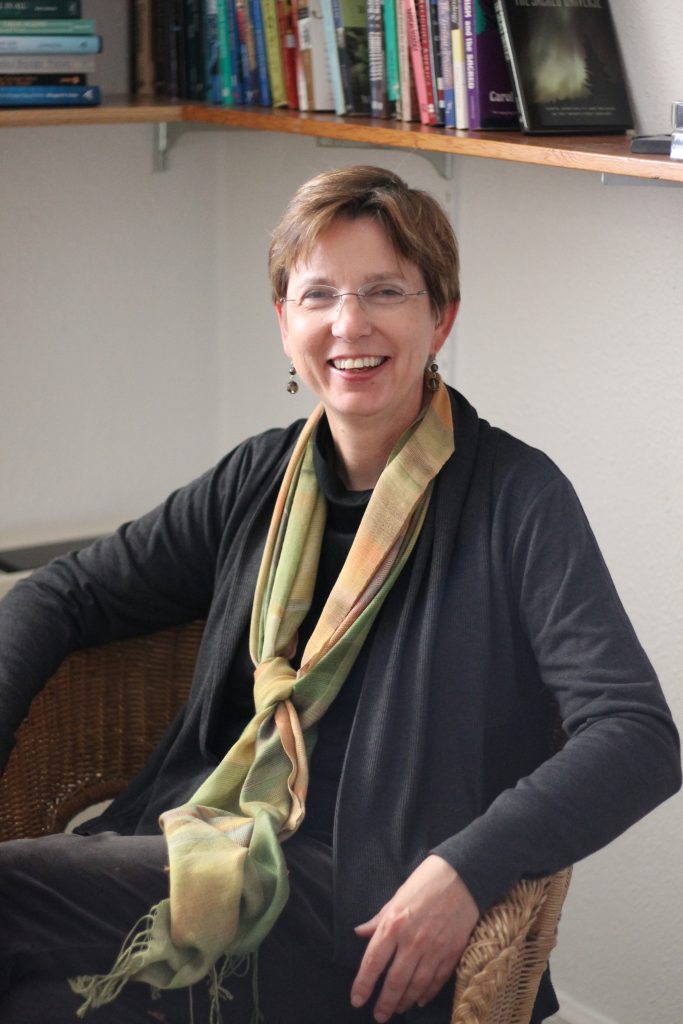
The new director of the Elliott Allen Institute for Theology and Ecology, Dr. Hilda Koster, sees the EAITE moving forward in the spirit of Laudato Si’, with particular attention to the needs and concerns of women, minorities and Indigenous communities.
The Institute, celebrating its 30th anniversary this year, was created by Fr. Stephen Dunn to address growing interest in the intersection between faith and the natural world.
“It is a great honour to be appointed Director of the Elliott Allen Institute, which has played such a prominent role in the development of ecological theology in Canada, especially by way of its sustained attention for the work of the visionary theologian Thomas Berry,” says Dr. Koster. “I am very grateful for the important work of the Institute’s founder Fr. Stephen Dunn, C.P., and his successor Dr. Dennis O’Hara. It is a privilege to carry their legacy forward.”
Strong leadership of the EAITE reflects the university’s core values expressed in St. Michael’s 180 strategic plan, says University President Dr. David Sylvester.
“We place great importance on our mandate to promote respectful dialogue on care for each other and for our common home. The work of the Institute helps to further St. Michael’s core values, and Dr. Koster will be an invaluable addition,” Dr. Sylvester says.
The Faculty of Theology is especially pleased to have found someone so well equipped to run a centre known around the world for its groundbreaking research and training, says Interim Dean Dr. John L. McLaughlin.
“Dr. Koster’s appointment as Director of the Elliot Allen Institute is good news not only for St. Michael’s but for anyone who cares about ecological theology as well as environmental and social justice,” Dr. McLaughlin says. “Since the EAITE was founded by Fr. Stephen Dunn in 1991 it has been shining a light on the kinds of issues Pope Francis addressed in his 2015 encyclical Laudato Si’: to recover our relationship with the natural world while also working for environmental justice.”
The need to examine ecological concerns in a theological light has never been greater, Dr. Koster says.
“Historically Christianity has not paid much attention to humanity’s relationship to the natural world but in light of climate change, overconsumption and species extinction this has become an essential area of theological reflection,” she says.
“Studying Theology and Ecology allows students to make connections between their faith traditions with knowledge of and appreciation for the more-than-human world. Yet ecotheology also will allow students to think deep and hard about the spiritual and moral challenges that result from our human caused destruction of precious ecosystems, and the suffering this is causing to vulnerable human communities.
“The Elliott Allen Institute therefore takes its lead from Pope Francis’ insight that ‘a true ecological approach always becomes a social approach; it must integrate questions of justice in debates on the environment, so as to hear both the cry of the earth and the cry of the poor (Laudato Si’, 49)’. We need educators, chaplains, social workers and scholars who have the competency to work with others to realize a more just and sustainable future for all, especially the poor.”
Born in the Netherlands, Dr. Koster received her Bachelor of Arts and Master of Divinity degrees from the University of Groningen. After further study at Princeton Theological Seminary and the Candler School of Theology at Emory University in Atlanta, she earned her doctorate at the University of Chicago. She joined St. Michael’s Faculty of Theology in July 2020, with teaching areas of ecotheology, feminist theology, and ethics. She assumes the directorship of the EAITE on July 1, 2021.
Describing the new Director as a “wonderful addition” to the Faculty, Rosemary Boissonneau, Dr. Koster’s research assistant, says Dr. Koster “challenges her students to look deeper and investigate theologically the conceptual frameworks and structures of domination underlying the socio-ecological crises of our times. I am confident that under her directorship, the Elliott Allen Institute for Theology and Ecology will be reinvigorated to continue its legacy as a vital centre of ecotheological learning and research.”
The EAITE is a collaborative teaching and research institute which offers a certificate of specialization in Theology and Ecology, as well as stand-alone Graduate Diploma in Theology and Ecology. Its interdisciplinary, collaborative nature brings a range of academic voices from the sciences and humanities into conversation on matters of the day.
The 10-course diploma is aimed at professionals and students who wish to integrate the study of environmental issues and theology in their professional careers, as well as for those who wish to study the theological and ethical dimension of environmental problems. It includes five foundational courses, one in-depth course, two ecology and theology-specifics courses, one experiential course, and one capstone course.
The newly revised certificate is open to anyone enrolled in any of the graduate programs at the Toronto School of Theology seeking to specialize in Theology and Ecology. Certificate requirements vary depending on the program being completed.
“The Elliott Allen Institute will continue to be a place for innovative theological education and scholarship, with attention to the voices of women, minorities and Indigenous communities,” says Dr. Koster.
For more information on the Elliott Allen Institute’s offerings, please contact Programs Coordinator Anthony De Feo or Dr. Koster directly.
The Vatican has designated May 16–24, 2020 Laudato Si’ Week to mark the 5th anniversary of the completion of Pope Francis’s groundbreaking document Laudato Si’: On care for our common home. (The document was formally signed on May 24, 2015 and released on June 18, 2015.) The global campaign is sponsored by the Vatican’s Dicastery for Promoting Human Development, and is designed to spur Catholics to become more involved in environmental action.
Dr. Dennis O’Hara, who authored the reflection below, edited a book on Laudato Si’ with Matt Eaton and Michael Ross. The book, Integral Ecology for a More Sustainable World: Dialogues with Laudato Si’, brought together scholars from around the world with diverse backgrounds, including Chris Hrynkow, Cardinal Turkson, Brother Guy Consolmagno (Director of the Vatican Observatory), Sue Rakoczy, and John Haught. Drs. O’Hara, Eaton and Hrynkow are graduates of the Elliott Allen Institute for Theology and Ecology at the Faculty of Theology, and Michael Ross is an EAITE doctoral student.
Laudato Si’ Five Years Later
Even before its promulgation on June 18, 2015, the papal encyclical, “Laudato Si’: On Care for Our Common Home,” had created tremendous advance interest. At the time, I was serving as Director of St. Michael’s Elliott Allen Institute for Theology and Ecology (EAITE) and thus was frequently invited to speculate on the possible content of the encyclical, including on a student radio show, at a conference on religion and cosmology at Yale University, and in parishes of both Christian and non-Christian faiths.
Prior to its official release, I was given an advance copy of the encyclical so that I could prepare for the anticipated media attention. Interviews for radio, television, and newspapers punctuated the next several days, to be followed by talks at conferences, for school boards and NGOs, and in many parishes, both in Canada and Korea. This unprecedented interest was echoed in the encyclical’s enthusiastic reception at the 21st Conference of the Parties (COP21) of the United Nations Framework Convention on Climate Change at Paris in 2015, resulting in the Paris Climate Agreement. The encyclical inspired the formation of hundreds of new Catholic organizations to advance its goals, including the Global Catholic Climate Movement (a global network of 900 Catholic organizations) and the Catholic Climate Covenant as well as numerous initiatives of religious orders and the expansion of the work of Catholic NGOs to address an increased concern for our common home. It also spurred the interfaith project Living the Change, and the formation of the Vatican Dicastery for Promoting Integral Human Development. The encyclical continues to be favourably referenced in academic circles among diverse disciplines, including theology, ecology, economics, justice, social studies, healthcare, and more.
With the advantage of five years since its release, a retrospective assessment of Laudato si’ gives a fuller appreciation of its accomplishments. For decades, ecotheologians had acknowledged the Christian teaching that there are two books of sacred revelation—viz., scripture and creation—bringing a renewed focus to exploring the theological and ethical implications of a more sympathetic and scholarly reading of the latter. They had been pioneering a deeper understanding of humanity’s role within the epic of evolution and advocating for a more integrated understanding of the myriad of justice issues related to the ecological crisis. Pope Francis’ first encyclical validated their decades of innovative work.
The call of Laudato si’ to recognize the integral ecology of creation and to engage in conversations of respectful dialogue with diverse voices from all sectors of society, emphasized the intersectionality of ecological, ethical, economic, political, social, gender, and justice issues. Through such efforts, the encyclical articulated a more robust and integrated version of Catholic Social Teaching. Concurrently, it required the conversion of ourselves and our cultures, eschewing a consumerist individuality in preference for the health of the common good and our common home. As the magnitude and urgency of the ecological crisis in its multiple forms became better understood within more disciplines and by more people, the comparable magnitude, complexity, and intersectionality of this conversion also became more apparent.
Nevertheless, such awareness has not spurred an adequate response within either secular or religious institutions. For example, the concentration of greenhouse gases in the atmosphere continues to increase while the vitality of life on Earth declines despite generally universal calls for a vigorous reversal of both. This past November, the retiring president of the U.S. Conference of Catholic Bishops described climate change as “important but not urgent.” Yet as Msgr. Bruno Marie Duffe, secretary of the Dicastery for Promoting Integral Human Development warns, ” the alarming speed of climate change caused by human behavior and the choices we make threaten the very survival of species, water and air quality as well as food security. These are huge challenges…and the Paris Agreement is an absolute minimum and in fact does not go far enough.” Despite fine rhetoric, few nations are likely to reach the pledges they made with that agreement.
Laudato si’ continues to challenge this delinquency among nations and within its own Church. Its observations, assessments, and calls for action often serve as a standard against which efforts are measured or as an interlocutor that nurtures or guides responses to global crises. The contrast between the analyses and aspirations of the encyclical, and the anemic responses and sclerotic leadership still too often seen, shows that while the encyclical has had significant impact, the conversion it prescribes is far from realized. Like every good encyclical, Laudato si’ needs to be read and re-read to better understand and apply its message.

